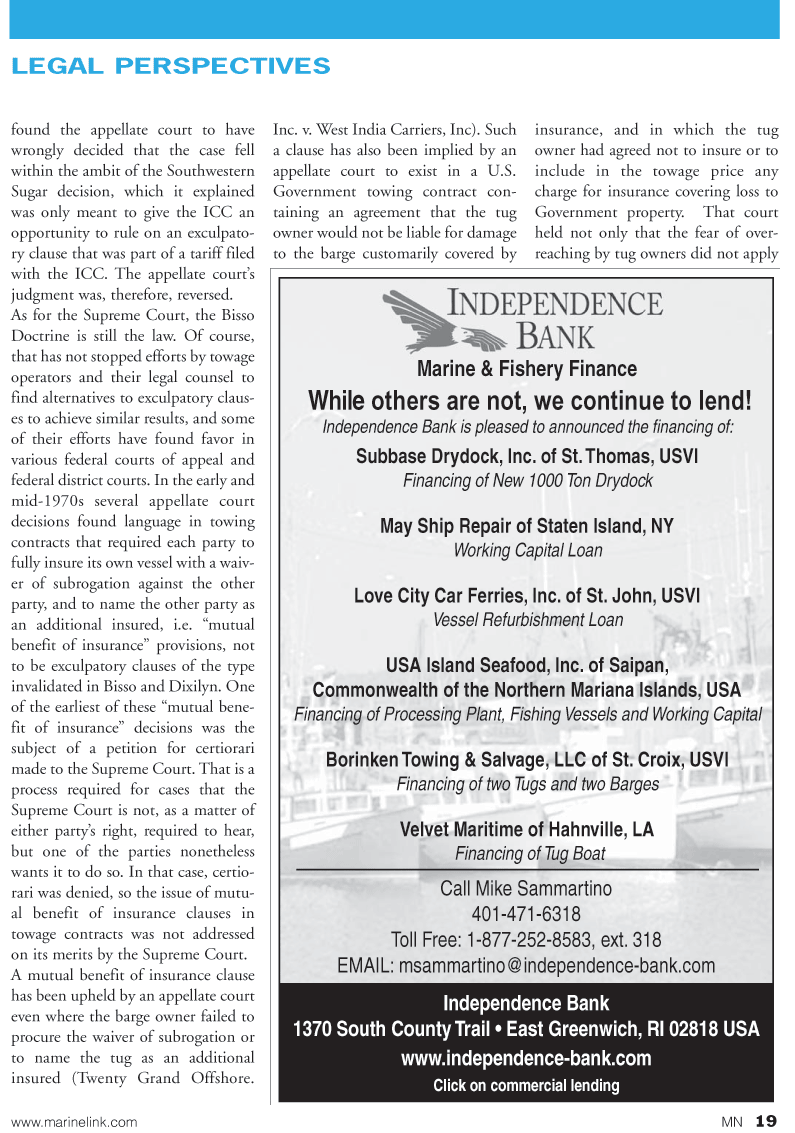
Page 19: of Marine News Magazine (December 2010)
Great Ships of 2010
Read this page in Pdf, Flash or Html5 edition of December 2010 Marine News Magazine
www.marinelink.com MN 19 found the appellate court to have wrongly decided that the case fell within the ambit of the Southwestern
Sugar decision, which it explained was only meant to give the ICC an opportunity to rule on an exculpato- ry clause that was part of a tariff filed with the ICC. The appellate court’s judgment was, therefore, reversed.
As for the Supreme Court, the Bisso
Doctrine is still the law. Of course, that has not stopped efforts by towage operators and their legal counsel to find alternatives to exculpatory claus- es to achieve similar results, and some of their efforts have found favor in various federal courts of appeal and federal district courts. In the early and mid-1970s several appellate court decisions found language in towing contracts that required each party to fully insure its own vessel with a waiv- er of subrogation against the other party, and to name the other party as an additional insured, i.e. “mutual benefit of insurance” provisions, not to be exculpatory clauses of the type invalidated in Bisso and Dixilyn. One of the earliest of these “mutual bene- fit of insurance” decisions was the subject of a petition for certiorari made to the Supreme Court. That is a process required for cases that the
Supreme Court is not, as a matter of either party’s right, required to hear, but one of the parties nonetheless wants it to do so. In that case, certio- rari was denied, so the issue of mutu- al benefit of insurance clauses in towage contracts was not addressed on its merits by the Supreme Court.
A mutual benefit of insurance clause has been upheld by an appellate court even where the barge owner failed to procure the waiver of subrogation or to name the tug as an additional insured (Twenty Grand Offshore.
Inc. v. West India Carriers, Inc). Such a clause has also been implied by an appellate court to exist in a U.S.
Government towing contract con- taining an agreement that the tug owner would not be liable for damage to the barge customarily covered by insurance, and in which the tug owner had agreed not to insure or to include in the towage price any charge for insurance covering loss to
Government property. That court held not only that the fear of over- reaching by tug owners did not apply
While others are not, we continue to lend!
Independence Bank is pleased to announced the financing of:
Independence Bank 1370 South County Trail • East Greenwich, RI 02818 USA www.independence-bank.com
Click on commercial lending
Call Mike Sammartino 401-471-6318
Toll Free: 1-877-252-8583, ext. 318
EMAIL: [email protected]
Subbase Drydock, Inc. of St. Thomas, USVI
Financing of New 1000 Ton Drydock
May Ship Repair of Staten Island, NY
Working Capital Loan
Love City Car Ferries, Inc. of St. John, USVI
Vessel Refurbishment Loan
USA Island Seafood, Inc. of Saipan,
Commonwealth of the Northern Mariana Islands, USA
Financing of Processing Plant, Fishing Vessels and Working Capital
Borinken Towing & Salvage, LLC of St. Croix, USVI
Financing of two Tugs and two Barges
Velvet Maritime of Hahnville, LA
Financing of Tug Boat
Marine & Fishery Finance
LEGAL PERSPECTIVES

 18
18

 20
20
